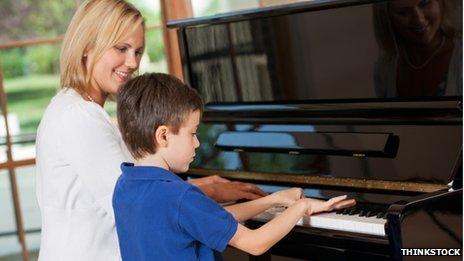Professional parents 'move for good schools'
- Published

The report found professional parents were more likely to pay for weekly music, drama or sporting lessons
About one in three (32%) professional parents in England has moved to an area they consider to have good schools, research suggests.
A study by the Sutton Trust indicated 18% had moved to live in the catchment area of a specific school.
And 2% admitted to buying a second home to use that address for a given school.
The Policy Exchange said rather than castigating parents who did their best for their children, the focus must be improving teaching in poorer areas.
The report, called Parent Power? Using money and information to boost children's chances of educational success, was based on a YouGov survey of 1,173 parents.
Analysis of the results by the Sutton Trust found 3% admitted using a relative's address to get their children into a particular school.
It found 6% admitted attending church services when they did not previously do so, to get their child into a church school - including 10% of upper-middle-class families surveyed.
Professional parents were also more likely to pay for the "cultural capital" of weekly music, drama or sporting lessons and activities outside school.
More than two-thirds (68%) of professionals did so, compared with 47% of working-class parents and 31% of the lowest income parents.
Enrichment activities
Sir Peter Lampl, chairman of the Sutton Trust, said: "This research suggests that those with money actively choose to live near good schools, employ tutors and ensure their children have extra lessons and enrichment activities that are often too expensive for other families to afford.
"This provides a significant advantage in school choice and in developing the cultural capital that is so important to social mobility and later success.
"Education is about more than what happens at school, and providing a more level playing field in school choice and out-of-school activities is essential if every child is to achieve his or her potential."
Sir Peter advocated the introduction of ballots for school admissions so that the best schools are not just for those who can afford to live nearby.
Prof Becky Francis, one of the authors of the report, said: "Our research shows just how far equality of opportunity is being undermined by the greater purchasing power of some parents.
"The ability for some parents but not others to use financial resources to secure their children's achievement poses real impediments for social mobility, which need to be recognised and addressed as detrimental to society."
Scapegoats

Many professional parents will say they have to do the best for their children
But Nick Faith, from the Policy Exchange think tank, said: "It's not right to stigmatise parents for trying to do the best by their children.
"Instead of making scapegoats of people who are simply attempting to improve the life chances of their kids, the focus should be on driving up the quality of teaching in the poorest areas of the country.
"At the moment a child living in one of the most deprived areas of the UK is a year behind a child from the richest areas in terms of vocabulary development.
"There must be a renewed drive to improve the quality of pre-school teaching, both in nurseries and children's centres. Schools must also encourage all children, regardless of their backgrounds, to reach their full potential.
"These measures, rather than castigating specific groups of parents, will be lead to better educational outcomes for all children."
Quality information
The Sutton Trust report calls on schools to publish socioeconomic data on applications and admissions to encourage "inclusive practice".
It also says the government should improve the range and quality of information available to working-class parents.
And ministers should extend the pupil premium to provide means-tested vouchers to enable working-class parents to offer the extra lessons and cultural activities for their children that other parents take for granted.
"The recommendation would empower families to take ownership of their children's developmental and educational opportunities," the report says.
More attention should be given to progress and value-added measures in school league tables (in England) so that schools are encouraged to focus on all their students, it adds.
A spokeswoman for the Department for Education said: "We want all parents to have the choice of a good local state school.
"That is why we are replacing failing schools with sponsored academies, which are proven to raise standards, opening new free schools where parents want them and introducing a more rigorous curriculum, with qualifications that match the world's best."
Dr Mary Bousted, general secretary of the Association of Teachers and Lecturers, said: "While shocking, the findings of this report come as no surprise.
"English schools have highly uneven intakes. Some schools open their doors to poor and harder to educate children, while others play fast and loose with the admissions code to ensure they get better exam results.
"Until school admissions are properly policed we will continue to have a highly divided and unequal schooling system and society."
- Published8 November 2013
- Published6 September 2013